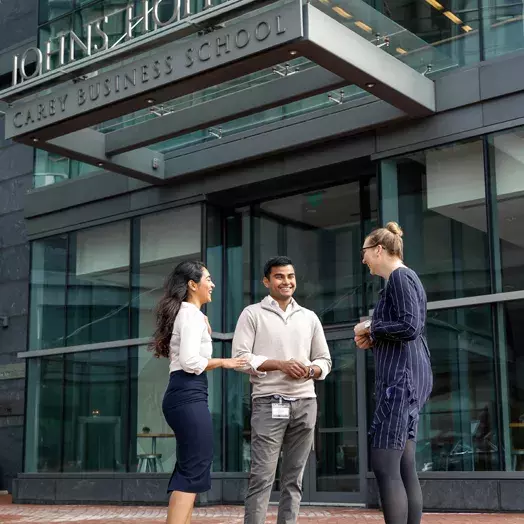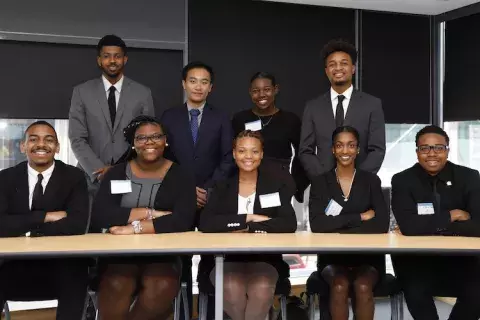
Inaugural Summer Business Academy opens doors for scholars
For one week in July, the inaugural Summer Business Academy exposed a select group of rising college juniors and seniors to team building, management and leadership theory, and its applications through a real world case competition. The academy also featured guest speakers, a field trip/service experience, and discussions with Carey alumni and faculty.
Summer Business Academy Scholars 2019
The purpose of the academy, explained Carey’s Roger Williams, senior associate director, Diversity and Inclusion, Community and Corporate Outreach, Office of Admissions, is “to expose historically underrepresented undergraduate students to the values of business education and where that might fit into their career and professional development.” In particular, one of the goals is to connect with students currently enrolled in Historically Black Colleges and Universities (HBCUs), in order to explore new business education opportunities and partnerships.
The genesis of an idea for such an academy occurred several years ago, according to James Calvin, professor in Management and Organization at Carey, and, with Williams, co-hosts of the academy. A conversation with John Hunter, recently retired executive vice president of Customer Fulfillment Services at QVC and a member of Carey’s Dean’s Advisory Council, spurred the creation of “Leading a Diverse Society,” a mentorship and enrollment program focused on underrepresented minorities. From that came a “commitment that we would move towards, and with Roger’s leadership, partner to produce what has now resulted in this inaugural summer business academy,” said Calvin.
Much of the inspiration and expertise for the academy is derived from the school’s successful Leadership Development Graduate Certificate Program, which concluded in 2013. That program, which also reached out to and engaged minority managers and rising c-suite level leaders, produced many of the alumni active in the academy and other Carey initiatives, as LDP graduates share their stories of growth and success. “The link to the future comes from the past, in many of the successes of the LDP program,” observed Calvin.
For its first year, the academy was composed of 10 students, or scholars as they are known. The goal next year is to increase the number of scholars to 16-20. To that end, “funding has been established for the next three years to give us a runway to help build this program,” said Williams. “This connects to communities where Carey wants to be, and this [academy] is an enabler,” added Calvin. The “rich curriculum” and “exciting case partners” are, in particular, “seeking to impact the lives of people living and working in Baltimore City,” he added. It is fitting, then, that the academy’s first case study competition partner was Strong City Baltimore, an organization providing management, finance, human resources, administration, and compliance services to fellow nonprofits, in Baltimore, the state of Maryland, and nationally. Scholars made recommendations regarding its business model that the organization had not considered. So impressed was Strong City Baltimore, it has already agreed to partner for next year’s case competition.
A critical part of the academy is having alumni share their stories of striving and success. A networking dinner with senior business leaders from the Baltimore and Washington, D.C. area allows academy scholars to make that connection, especially with successful minority alumni. “We want them to be able to see themselves going forward,” said Calvin.
“We want students to start to get a sense of, not only through the case studies but also through the field visits, how their degree can impact their community,” said Williams. “You might not always see that fit. Not only are we close with some of the industry leaders in Baltimore, we’re also closing in on nonprofits that are moving the needle.”
For its inaugural field trip/service experience partners, the academy engaged Center for Urban Families (CFUF), whose core mission is to strengthen urban communities by helping fathers and families achieve stability and economic success, and Baltimore Corps, enlisting area talent to accelerate social innovation in Baltimore and advance a citywide agenda for equity and racial justice.
Michael Weaver, a rising senior at Howard University who is majoring in business finance (and is serving an internship at Fannie Mae this summer), was one of the inaugural academy scholars. [The experience] “has definitely exceeded my expectations” he said. “Coming in as one of the first cohort members, to have this experience, I believe I’ve gained a lot more than I expected. Between the case studies, the speakers, it has really allowed us to walk away from this experience feeling like we’re more inclined to develop who we are, not just as individuals, but how we can make changes in the workplace and go from here.”
Weaver sees his academy experience as dovetailing with his future pursuits. “I believe this experience has shown me, beyond the classroom, beyond the graduate degree, things like what goes into a case study, how to develop your personal skills in the workplace, how to ‘show up’ in corporate America. This program has given me a lot more insight.”
One of those insights, according to Weaver, is collaboration. “In school, we learn the academic things,” he said. “But having the opportunity to be with so many diverse people – none of us are alike and we just mesh – with that we’ve been able to feed off each other and really learn from our experiences … the program did a really good job of creating a safe space and making it comfortable for us to really dig deep and [discover] what makes us who we are as individuals. Having that safe space, we’ve been able to truly pull from the depths of who we are, and really see how we can work with one another.”
Already, said Williams, plans are underway for next year’s academy. A stretch goal of 20 scholars, doubling the inaugural academy size, is ambitious, but not out of the question. On the near agenda is analyzing this year’s results, tweaking and adding selective curriculum elements, and reviewing scheduling of the academy to allow for summer internships and other scholar activities. But Williams has allowed at least a bit of time to reflect on and savor the results of this inaugural effort, which included Carey alumni, faculty, and staff embracing the scholars. “It was,” he summarized, “an exceptional week.”
